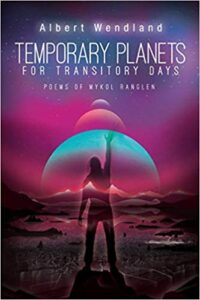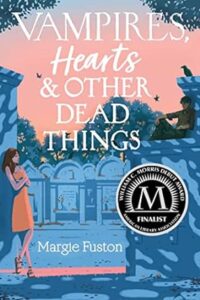
( Bookshop.org | Amazon.com )
Temporary Planets for Transitory Days: Poems of Mykol Ranglen by Albert Wendland
Dog Star Books, 2020
ISBN: 978-1-947879-18-8
Available: Paperback, Kindle
Mykol Ranglen, adventurer, talented finder of rare Clips left behind by the Airafanes, keeper of secrets, and central character of Albert Wendland’s science fiction books The Man Who Loved Alien Landscapes (2014) and In a Suspect Universe (2018) has always been a poet. In the first book, he describes one alien landscape as “dazzle” running through “the dew-laced savanna” with “scents of basil and almond” as the grass makes “soft cracking sounds like static electricity.” In the second book, apocalyptic visions from his poems become real and threaten the safety of the woman he loves. So, it is no surprise that Wendland was inspired to write a third book, a collection of speculative poetry, supposedly written by this enigmatic character.
Temporary Planets for Transitory Days is a more concise version of ideas introduced in the novels. In all three books, Wendland looks at what might happen in futuristic human/alien worlds that continue to be influenced by past civilizations and mythologies. He imagines these worlds as places which have devolved. They are inadequate for living and never change because they are controlled by technology and lacking in what we might recognize as a humanizing touch. Creatives like Ranglen and his lover Mileen, a painter, are living in worlds that the reader can still recognize as having links to our times with “aircars” for speedy transportation, competitive people using “card-links” to make business contacts, and gangsters who traffic “the deprived and homeless.” At the same time, these new worlds are nightmarish developments of what might have once seemed like exciting possibilities such as teleportation (but with time glitches, so at what point is Ranglen in his relationship with Mileen in a certain place?) or the projection of the imagination into harmful and even deadly objects or scenarios that cannot be controlled (was someone killed by a unique type of aircar that only existed in a poem Ranglen wrote?).
The poems are divided into groups and include some that directly reference characters and events in the books, some that might be about the author’s actual life, and others that seem inspired by Wendland’s own reading and teaching as a professor of literature. There are even poems involving superheroes, Native American mythology, and vampires. Overall, Wendland and Ranglen seem to be attracted to writing about their eclectic, science-fiction infused personal interests as well as sudden, intense encounters and events that are best captured as poetic memories. In addition, the poems even predict Ranglen’s future because Wendland notes that these poems will lead to two more Ranglen novels “yet to be written.”
In the poem “Notes Toward a Supreme Science Fiction,” we learn what Wendland values most in writing science fiction: “The obsessed, the pursued, / And the space / In between.” He sees, as he says in “Negotiating a Dream” an opportunity when we might be able to “Maybe even appropriate/ Some other era’s / Lost stellar dreams.” In contrast, the love poems in the Planetary Love section of the book are more immediate, focusing on what loving someone means and how that love is an action and unifying force rather than being an exploration of complicated emotions. Ranglen talks about that “singular moment” when the “world of another person is open” (“In a Moment”) and about loving in a “language” “that came before words” (“The Touch”). The poem that defines Ranglen best has the same title as the first novel and appears toward the end of the collection. However, there is also an excellent introduction to the poetry that helps the reader for whom Ranglen is a stranger to understand, in broad strokes, the context of the poems as a whole.
If you want to experience a pleasant feeling of recognition, like a memory, read the novels first. If you decide to read the poems first, it would be worthwhile to avoid dipping into the book randomly so that the poems will unfold in a logical way, thus providing enjoyment and understanding through a narrative approach as spare and direct as the prose of the novels. Recommended.
Reviewed by Nova Hadley







Follow Us!